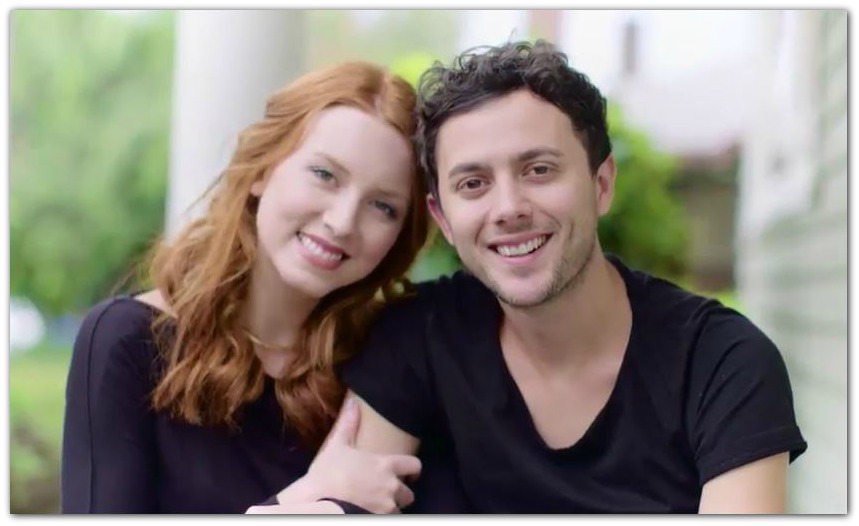
On BYU-TV’s Relative Race, four competing couples race across the U.S. for the chance to win $50,000. The couples travel to different cities where they’re given challenges to complete before being sent knocking on the doors of relatives discovered through DNA testing. In the second season, contestants Joe and Madison Greer receive a mysterious clue about their destination; it’s the address of a DNA match written on the back of a photo. “I think it’s me as a kid, and I’m with this lady,” explains Joe. “I felt like I knew who this was, and yet I didn’t.” Joe, whose mother died when he was a four-year-old, never met his father. In an interview with GenealogyMagazine.com, Joe Greer talks about his journey on Relative Race.
By JAMES PYLANT
© 2017 | Posted 31 March 2017
James Pylant: How much information did you have about your father before the show?
Joe Greer: Not too much information. I had a photograph, I knew his name, and I knew what he did for a living. I knew the area of the country where he lived, but that was about it. I had very little information. I exhausted Google, searched everything, and kept coming up with dead ends.
JP: Did Madison know much about her roots?
JG: Because of her background, she’s more connected to her family. We have two totally different stories when it comes to family background. She knew that there’s a possibility that while we’re on the show that we’re going to meet more of my relatives, and she was completely okay with that and supportive. She tells people that the big reason that she did this is for me.
JP: On the first episode you met someone on your father’s side of the family—a cousin. How did it feel to experience that on camera?
JG: Throughout the whole show, the cameras were never really an issue. We’re pretty comfortable around cameras, being photographers. That’s a natural thing for us. We were given this opportunity to make connections that lead to family. I was okay with it. It takes a lot for me to get uncomfortable or feel awkward, so it was no issue at all. The first relative that I’ve ever met on my father’s side was a fourth or fifth cousin, and that’s pretty distant, but it was the closest that I had ever come to finding about my father’s side of the family. As you can probably imagine, a big door opened.
JP: How did you feel about not only meeting strangers who are relatives but also you’re going to be overnight guests at their home?
JG: Yeah, it was fine. I’m very thankful that throughout it we didn’t have any crazy experiences, kind of like on season one where they put a couple of people in a tent in the backyard. We’re grateful that they were hospitable and welcomed us with open arms into their homes. It was an exciting experience, especially when the production crew left, and we’re all off camera—no mikes—and we’re able to have a conversation off camera.
JP: On the second episode you’re handed the address of the next relative that you’re to meet, but this is written on the reverse of a photograph made some 20 years earlier. It turns out that she’s your mom’s Aunt Juanita. Did you remember or recognize her when you met her that day?
JG: Yes. That photograph—I knew that that was me—and she looked familiar, which is crazy. There’s so much more that’s a part of my story with Juanita than was told on the show. It was one of the most unique experiences on the whole season. I think I said on the show it was the last thing that I was expecting. As you probably saw, that was an emotional reunion and such a special moment. I’ll cherish that day. You know, that’s the day we got a strike, but it was the least of my worries.
JP: You’re on a journey to find your father, and you receive this strike, and it’s only the second episode. Did you fear that this was going to end too soon?
JG: Oh, one hundred percent! Especially with the extremes of that day—we made it out first, we had first place, and then the complete opposite: we get a strike. The first three days were intense in terms of the game. When we got that strike on day two, I was so motivated, amped, and ready to go and make sure that we can do everything in our power to stay in this race as long as we can, because we had no idea of who were going to meet. I was hopeful for what was in store, and we had to step up and fight to the end.
JP: How would you describe the aftereffect, the impact of Relative Race on your life?
JG: It has radically changed my life. I hope to stay in touch with the relatives that we’ve met. Obliviously, we have to be secretive and private about that in terms of social media and posting photos and what we say, but I’m excited about the show and for every episode to be out so that I can be more public about it. It’s been wonderful. It’s changed our lives for the better. DNA testing opened doors to new relationships; it was the experience of a lifetime.
